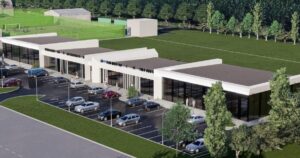
In Uzhhorod, construction has begun on a new retail park on the Kyiv–Chop highway, with its opening scheduled for summer 2026, according to consulting company Retail & Development Advisor (RDA), which is the exclusive broker for the retail property.
“Construction work on the site has already begun. The first phase of the project will involve the construction of a 3,500 sq m retail park and a sports area with football and paddle tennis courts, while the second phase will involve the construction of auxiliary premises,” said RDA CEO Andriy Lototsky.
This retail park will be built on the city’s bypass road, on the Kyiv-Chop international highway. This location is notable for its convenient transport links and high traffic volume (about 45,000 cars per day). A parking lot for 120 cars is planned near the retail park.
RDA has already begun the process of brokering the commercial property. The retail park’s tenants will include stores selling household goods, sportswear, and footwear, as well as fashion retailers, according to the announcement.
According to Lototsky, the rental space is planned to be transferred to retail operators for adaptation in May next year, and the official opening of the park is scheduled for August 2026.
Retail & Development Advisor (RDA) is a Ukrainian consulting company founded in 2013. It provides a full range of services in the field of retail and office real estate. It offers services in architectural concept development, brokerage, property management, outsourcing of the development/leasing department of shopping centers, and market analytics.
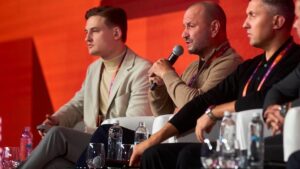
Kyiv retains its status as the most stable location for the development of investment rental projects in Ukraine, according to Alexander Ovcharenko, co-owner of Standard One.
In recent years, domestic investors have focused their attention on the income-generating real estate market, which is rapidly becoming more professional. Various categories of income-generating real estate are offered, from residential properties in Kyiv to resort formats in the Carpathians and Bali. Ovcharenko is confident in the advantages of the capital’s build-to-rent projects (buildings that are created and managed for long-term rental).
“Standard One was the first company to launch a full-fledged residential income property project on the Ukrainian market. When we built our first build-to-rent property, we proved 100% that it can work effectively in our market,“ he emphasized during the discussion ”Income-generating real estate: strategies of leaders“ at the ”Invest Forum: Real Estate,” which took place on November 27 in Kyiv.
According to him, the S1 VDNG project demonstrated a 10% annual return on rent and 48% capitalization during construction. This result, which attracts investors to the company’s subsequent projects, was achieved through a series of measures. A proprietary company was created to manage income-generating real estate, an online platform for leasing was developed, and service standards were developed so that investors receive predictable income and tenants receive comfort and security.
“Our operating company, S1 Property, completely relieves both tenants and investors of all their worries. We have developed our own 24/7 hotel-type service standards,” says Ovcharenko.
The expert noted that quality management is a critical component of a successful business model. That is why Standard One invests in engineering, reliable materials, standardized service, and security, because it is the developer, as the owner of this property, who will have to operate the building and repair it if necessary.
According to its business model, Standard One operates exclusively in the capital and focuses on construction in the most attractive locations for tenants in Kyiv: near the metro, with developed infrastructure and recreational areas. The company offers hotel-level service, convenient property management, ergonomic apartments, energy independence, and security. This creates long-term demand and high occupancy rates. But in general, the demand for rental housing in the capital has not decreased and continues to show steady growth.
“Today, we have almost zero vacancy, with 99% occupancy. And our format does not involve seasonality: people need to live in autumn, summer, and winter,” he says.
One of the key market trends is REIT (Real Estate Investment Trust). “Thanks to REIT, you can invest in income-generating residential real estate without buying an apartment. For 122,000 hryvnia, you can get the same return as the owner of an entire apartment. And it will bring a stable income. This is not a hypothesis, it is a fact. The results of our S1 REIT are better than we expected. Today, it is 8.4% in currency,” said Ovcharenko.
As for development plans, the network of income-generating buildings is currently being expanded, with three new projects in the implementation stage. S1 Obolon and S1 Poznyaki will operate according to the standard build-to-rent model, while S1 Terminal will have serviced apartments for short-stay/mid-stay needs (short-term and medium-term rentals). In addition, the company plans to launch a REIT in the future, in which the fund will own an entire building.
Standard One (S1) is a full-cycle development company that has been developing the income-generating (build-to-rent) real estate segment in Kyiv since 2016. Its portfolio includes the completed S1 VDNG project and the new S1 Obolon, S1 Terminal, S1 Nyvky, and S1 Poznyaki buildings.

Georgia from January 1, 2026 introduces a mandatory requirement of medical insurance for all foreign citizens crossing the border of the country. This is reported by the National Tourism Administration of Georgia and local media with reference to the updated Law on Tourism.
From this date, foreign tourists must have a medical and accident insurance policy in Georgian or English upon entry. The document must be valid from the moment of crossing the border and cover the entire period of stay in Georgia.
According to explanations of insurance companies and tour operators, the minimum parameters of coverage include payment for emergency outpatient services for at least 5 thousand dollars and inpatient treatment for at least 30 thousand dollars, including risks of accidents, injuries, sudden illnesses, medical evacuation and repatriation. A number of materials also mention the benchmark of the minimum sum insured at the level of GEL 30 thousand equivalent, but in the market for non-residents the benchmark of USD 30 thousand is used as a basic benchmark.
In case of absence of a valid policy, a fine of 300 GEL (about $110) is envisaged, and the border guard at its discretion can either offer to issue insurance on the spot or refuse entry. The new rules apply to all foreign citizens, regardless of citizenship and mode of entry, Georgian and international media emphasize.
Tour operators note that the greatest practical significance of the innovation will be for independent travelers who book flights and accommodation without package tours.
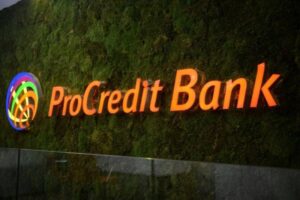
The European Investment Bank (EIB) has approved a project to provide ProCredit Bank (Kyiv) with a partial portfolio guarantee of EUR7 million, which will enable the financial institution to issue up to EUR35 million in loans to micro, small, and medium-sized enterprises (MSMEs).
As stated on the EIB website, the guarantee is part of the EU4Business Guarantee Facility II program, which aims to improve lending conditions for businesses, in particular by reducing collateral requirements and lowering interest rates, thereby expanding access to finance for MSMEs in Ukraine.
As reported, EU4Business Guarantee Facility II is a program under which the EIB provides Ukrainian banks with partial portfolio guarantees to expand lending to MSMEs. Its goal is to simplify access to financing for these enterprises by improving loan conditions. The total volume of the program is estimated at EUR 300 million, of which EUR 40 million is EIB guarantees. The project was approved on May 5, 2025.
ProCredit Bank is part of the ProCredit Holding AG (Germany) banking group, which owns 100% of its shares. According to the National Bank, as of October 1 this year, it ranked 16th (UAH 44.68 billion) among 60 banks in Ukraine in terms of total assets.
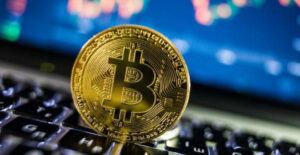
The cryptocurrency market remains under pressure in early December 2025 after a sharp decline in November, but has shown signs of stabilization in recent days: Bitcoin (BTC) is trading in the $90,000–92,000 range, remaining approximately 25–30% below its historic October high of over $120,000.
According to CoinMarketCap, the total capitalization of the cryptocurrency market on December 6–8 is about $3 trillion, which is significantly lower than the peak values of the fall, against the backdrop of the “December reckoning” — a continuation of the sell-off that began in November and intensified due to investors exiting spot Bitcoin ETFs and the unwinding of excess leverage.
Ethereum (ETH) is holding above $3,000 – around $3,100 – and looks stronger than Bitcoin in early December: a number of reviews note the local leadership of ETH and some of the major altcoins amid a recovery from November’s decline. Analysts admit the possibility of a move to $3,500–3,900 if the overall improvement in sentiment continues, although they emphasize that this requires maintaining the $3,000 mark as key support.
Among the factors determining the dynamics of December, market participants highlight, on the one hand, expectations of a 25 bp cut in the US Fed rate (probability of about 85-90%), which traditionally supports demand for risky assets, including cryptocurrencies, and, on the other hand, continued pressure from long-term holders who are taking profits and institutional players who are reducing their positions after the record rally of 2025.
The forecast for the end of 2025, according to analysts’ estimates, is cautiously neutral. For Bitcoin, the key range in the short term is considered to be $82,000–100,000: a breakout and consolidation above the psychological level of $100,000 could pave the way for a recovery towards $110,000–120,000, while failure to stay above $86–88 thousand will again increase the risks of a rollback to the lower part of the range.
For Ethereum, the baseline scenario assumes trading in the range of approximately $2.8–3.6 thousand, with possible attempts to break above it if global risk appetite improves.
Experts emphasize that the end of the year will be marked by increased volatility: the market is essentially completing a painful “reset” of excessive leverage and speculative positions. This creates the conditions for more sustainable growth in 2026 based on institutional demand, tokenization of real assets, and further clarification of regulations. However, in the last weeks of 2025, investors should be prepared for sharp intraday price fluctuations, according to analysts.
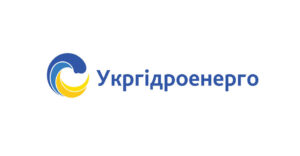
On December 8, Ukrhydroenergo announced a tender for car insurance for its branches, according to the Prozorro electronic public procurement system.
The expected cost of purchasing insurance services is UAH 4.620 million. The deadline for submitting documents for the tender is December 16.